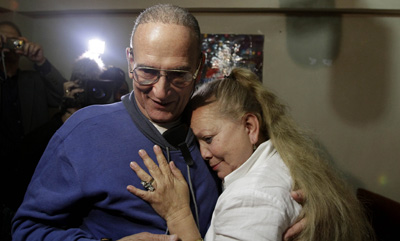Americas
2011
Attacks on the Press 2010: Honduras
Top Developments • Rash of journalist murders occurs in lawless, politically charged climate. • In murder investigations, authorities inattentive and dismissive. Key Statistic 3: Months between Nahúm Palacios Arteaga’s murder and the time authorities conducted an autopsy. Six journalists were murdered in a seven-week span, with three more slain by year’s end, a rash of…
Attacks on the Press 2010: Mexico
Top Developments • Amid rampant violence, Calderón backs federalization of anti-press crimes. • More than 30 journalists killed or disappeared since Calderón’s term began. Key Statistic 4: Journalists abducted in Durango by gangsters who demand that TV stations air their propaganda. Organized crime groups exerted fierce pressure on the Mexican press as their control spread…
Attacks on the Press 2010: United States
Top Developments • U.S. military ignores call for probe into killings of 16 journalists in Iraq. • Under Pearl Act, State Department will track press freedom worldwide. Key Statistic 14: Journalists imprisoned by U.S. military forces for prolonged periods without charge between 2004 and 2010. In two important advances, Congress passed legislation to track press…
Attacks on the Press 2010: Venezuela
Top Developments • Censorship spikes: RCTV banished again, newspapers barred from using crime images. • New laws restrict Internet content, tighten control over broadcast licenses. Key Statistic 1,300: Hours of presidential speeches that were aired between 1999 and 2010. Using all the tools of power, President Hugo Chávez Frías continued his aggressive campaign to silence…
Attacks on the Press 2010: Americas Developments
ATTACKS ON THE PRESS: 2010 • Main Index AMERICAS Regional Analysis: • In Latin America, A Return of Censorship Country Summaries • Argentina • Brazil • Colombia • Cuba • Ecuador • Haiti • Honduras • Mexico • United States • Venezuela • Other nations BOLIVIA In October, President Evo Morales signed a measure named…

Is Chávez promoting free expression? Check the facts
Venezuelan Information Minister Andrés Izarra declared on the state television channel VTV last week that “never has so much been done to guarantee, promote, and drive freedom of expression than in the government of President Hugo Chávez.” Izarra needs to hire a fact-checker.

Journalist released on parole, allowed to stay in Cuba
New York, February 14, 2011–The Committee to Protect Journalists called on Cuban authorities today to place no conditions on the release of journalist Héctor Maseda Gutiérrez, who was freed on parole Saturday. Maseda Gutiérrez is a founding member of the independent news agency Grupo de Trabajo Decoro and a winner of CPJ’s International Press Freedom…

Cuba’s Maseda Gutiérrez balks at conditions for freedom
New York, February 11, 2011–The Catholic Church in Havana announced today that jailed Cuban journalist Héctor Maseda Gutiérrez, a CPJ International Press Freedom Awardee, at left, would be released after nearly eight years behind bars. But news reports, including one citing the journalist’s wife, said Maseda Gutiérrez has balked at conditions placed on his release…
Broadcast offices attacked in Mexico; engineer killed
New York, February 11, 2011–The Committee to Protect Journalists condemns Wednesday’s violent attack against two media companies in the Mexican city of Torreón, Coahuila state, during which a TV engineer was shot to death and equipment was destroyed and stolen.

Aristegui’s dismissal is troubling and inappropriate
On Friday, opposition legislators in Mexico disrupted a congressional session by raising a banner with an image of President Felipe Calderón and a message that read: “Would you let a drunk drive your car? No, right? So why would you let one drive your country?” Radio MVS’ Carmen Aristegui, one of Mexico’s most popular journalists,…